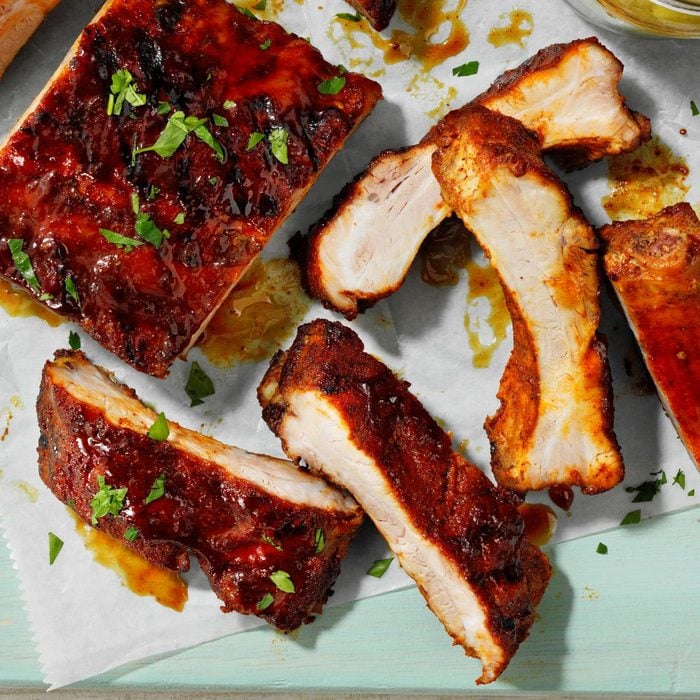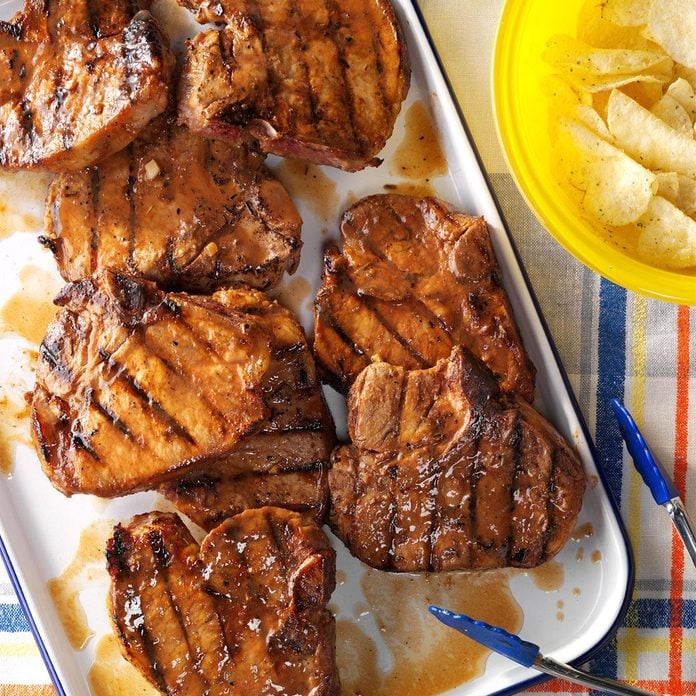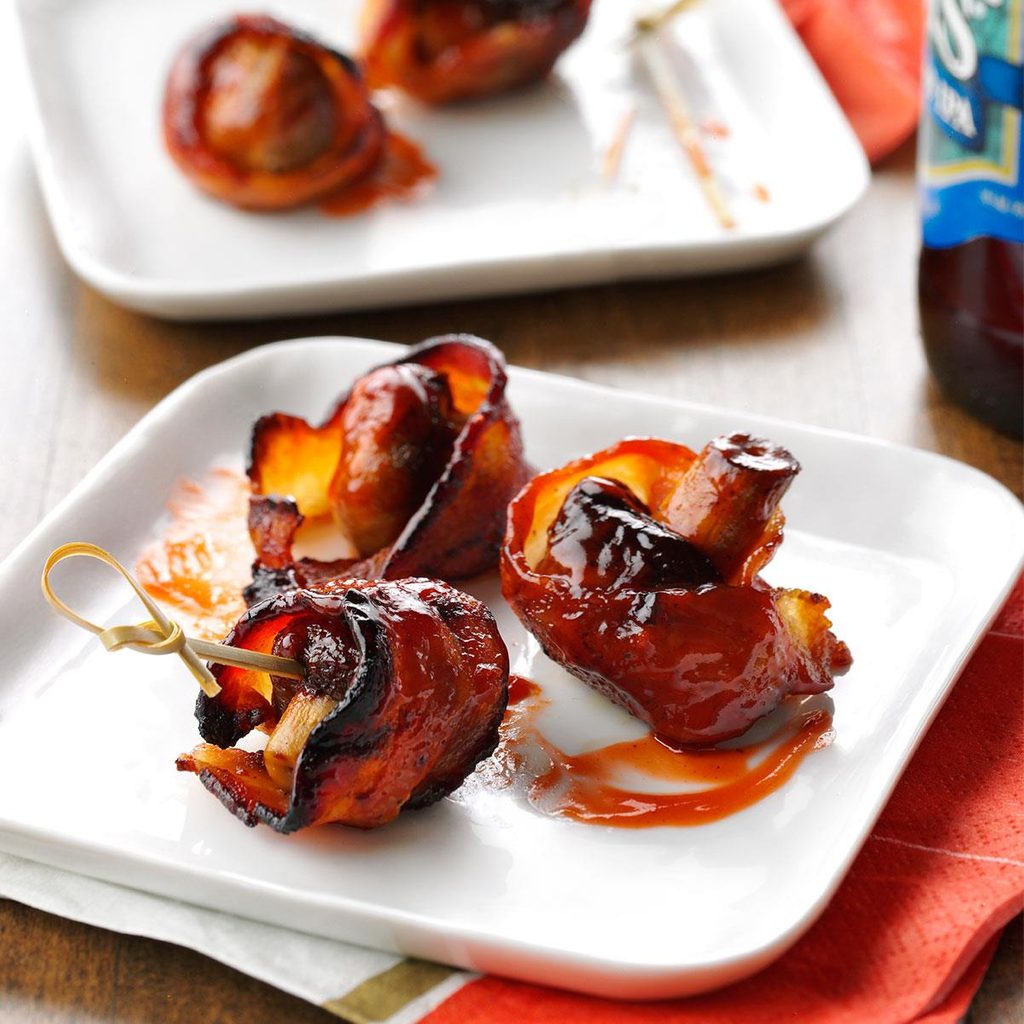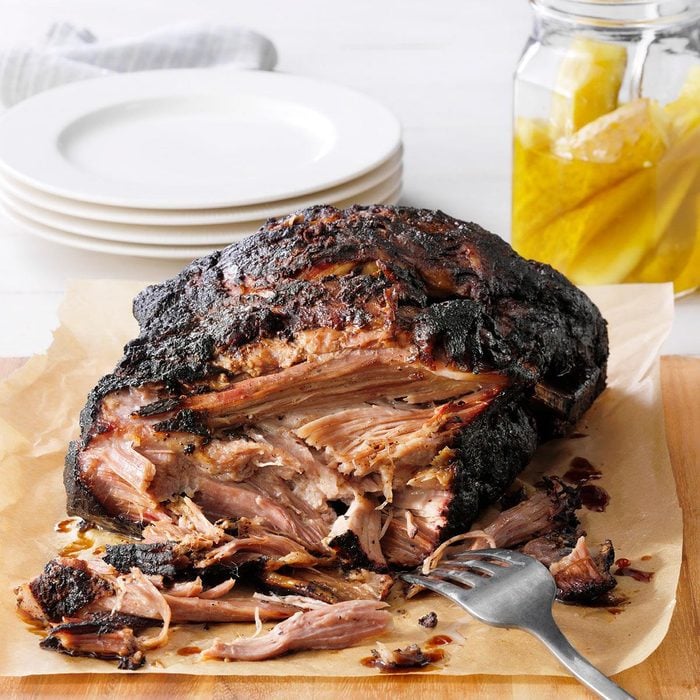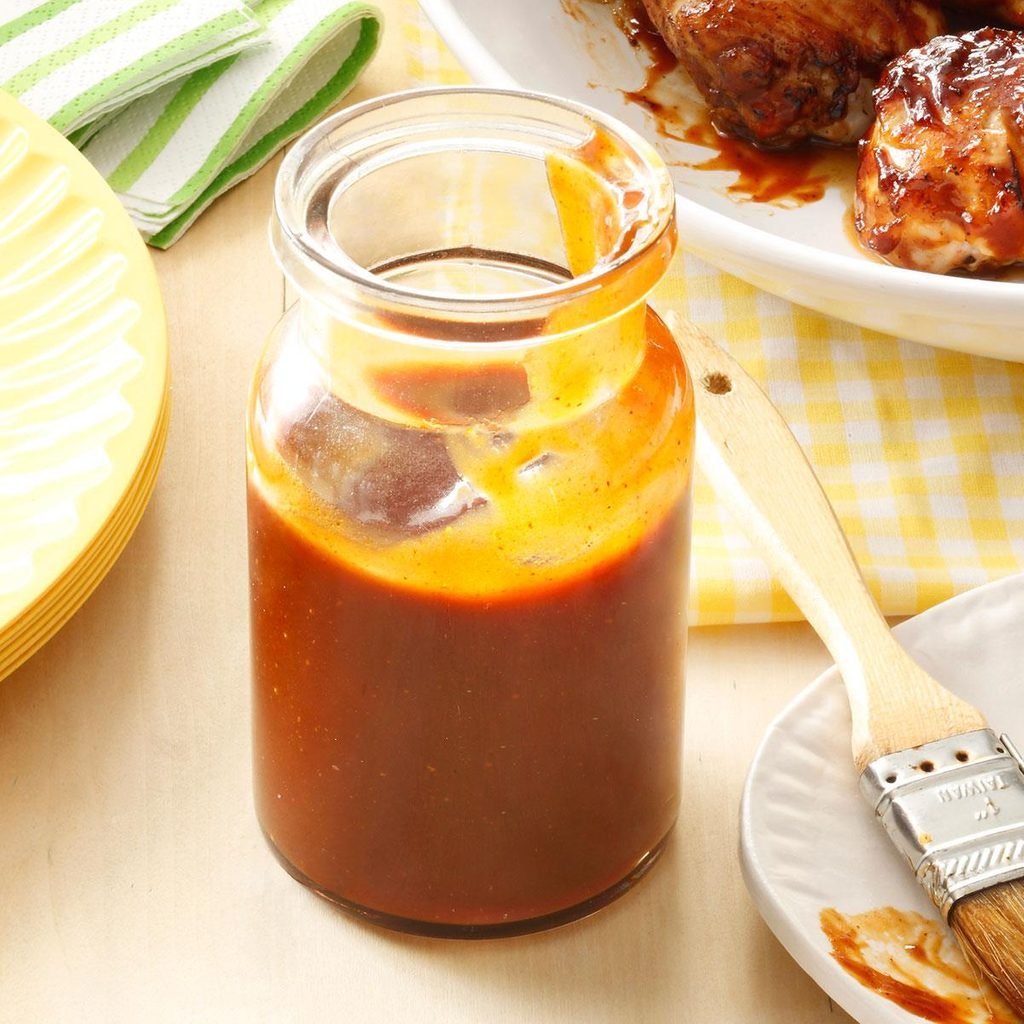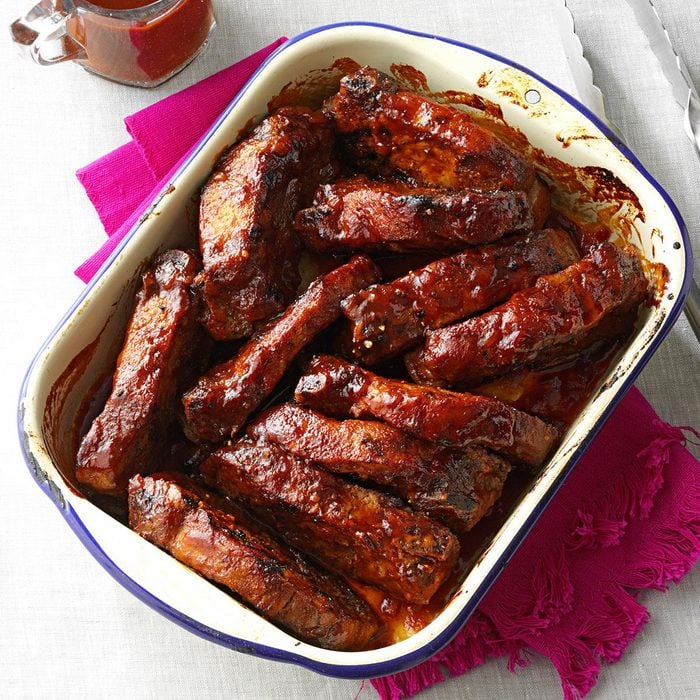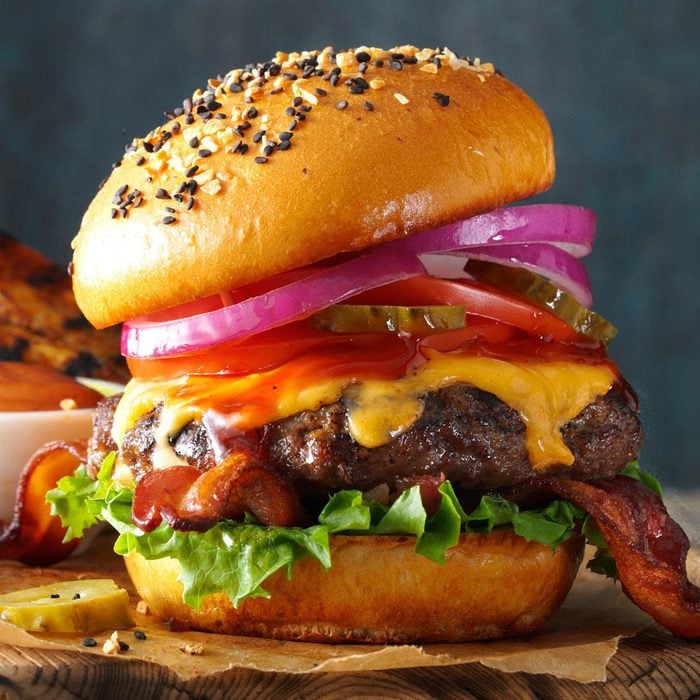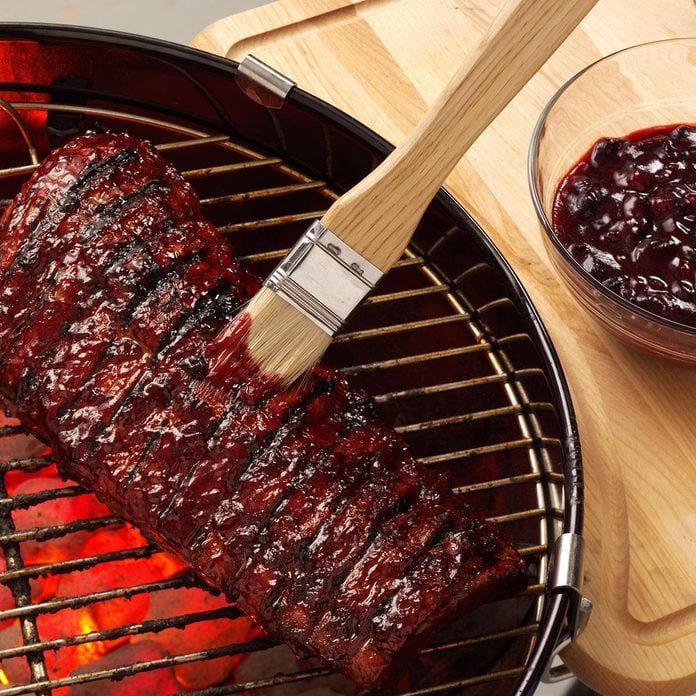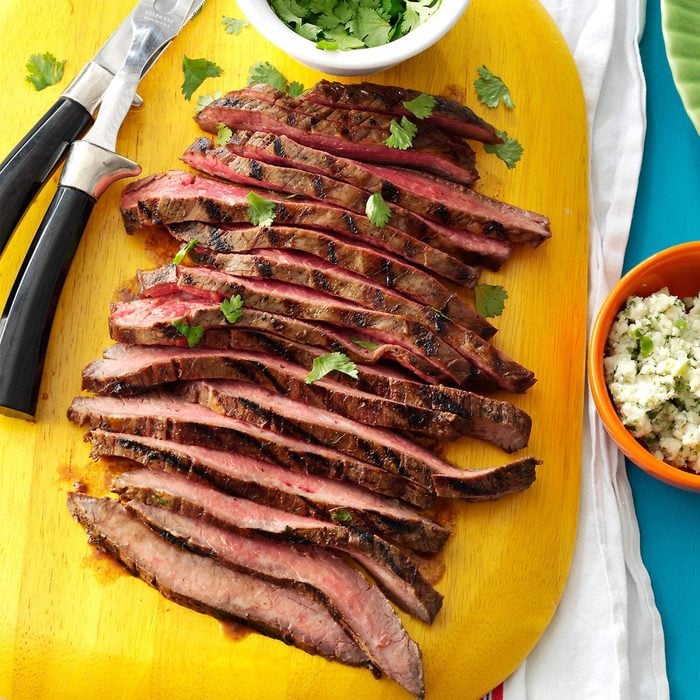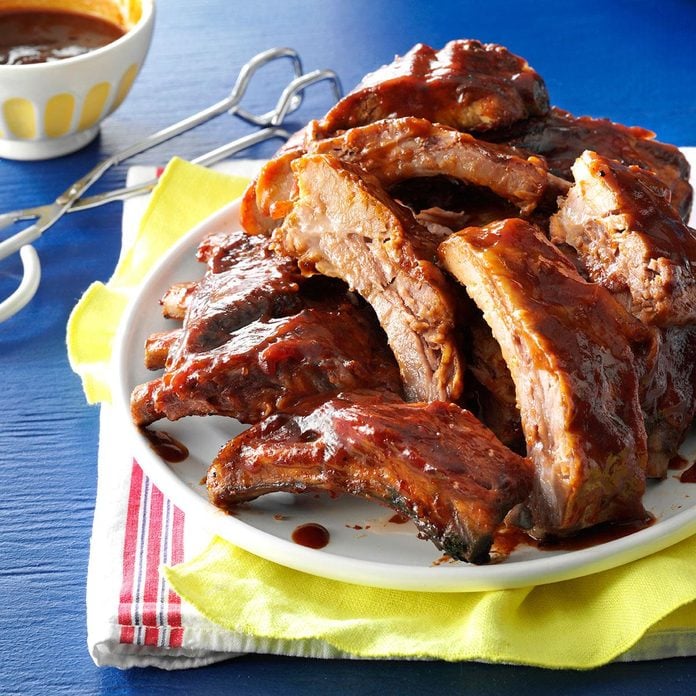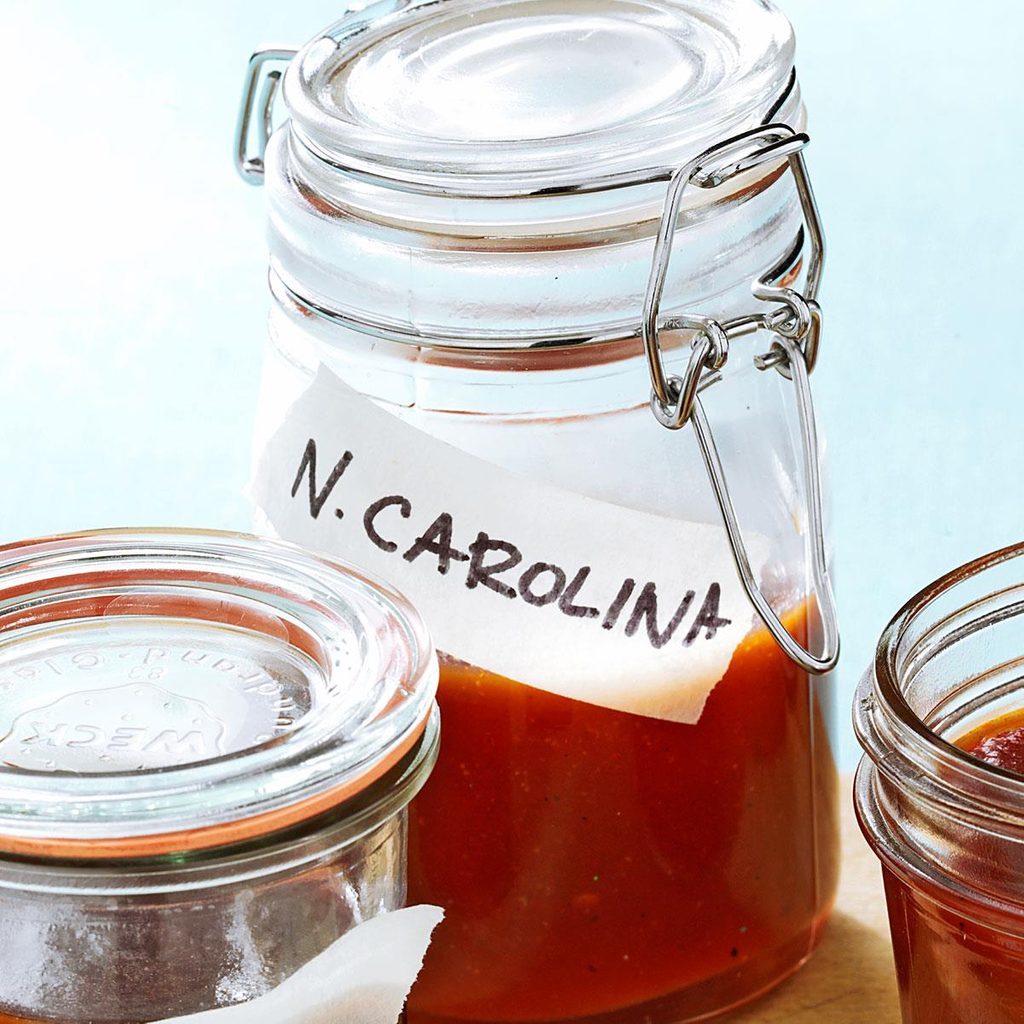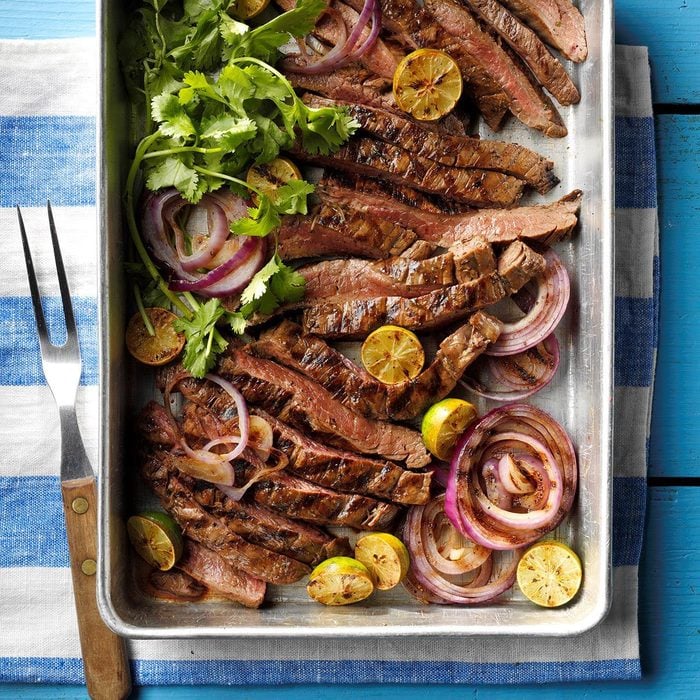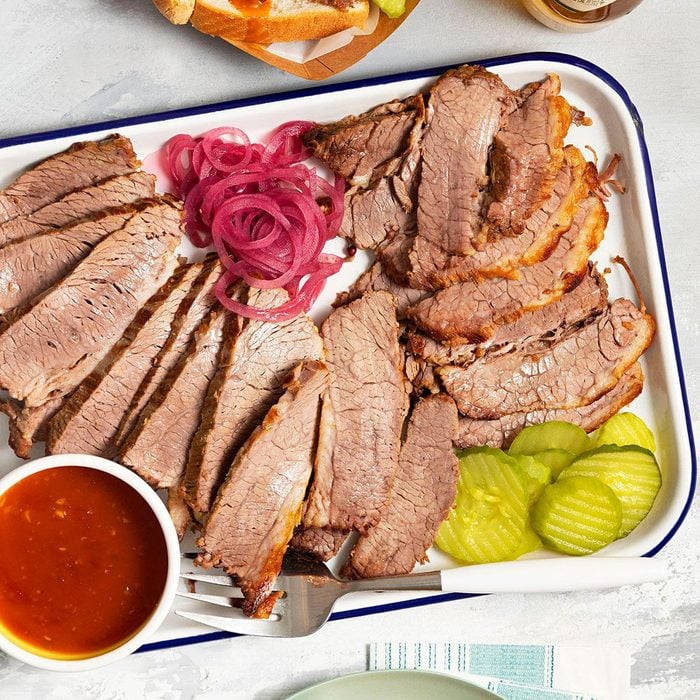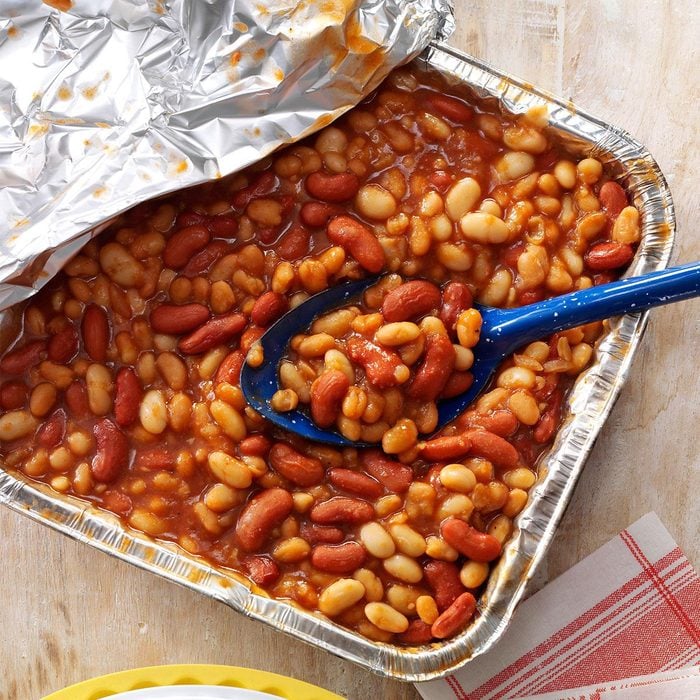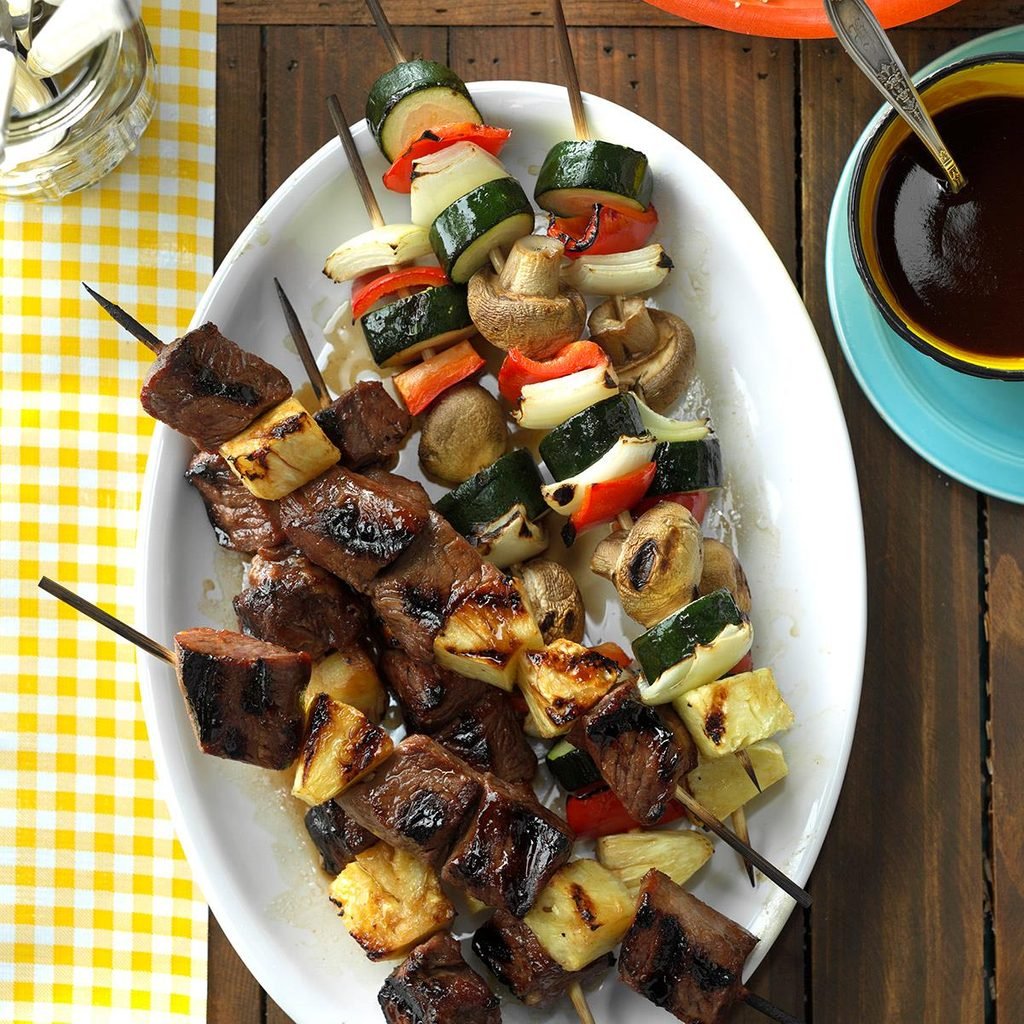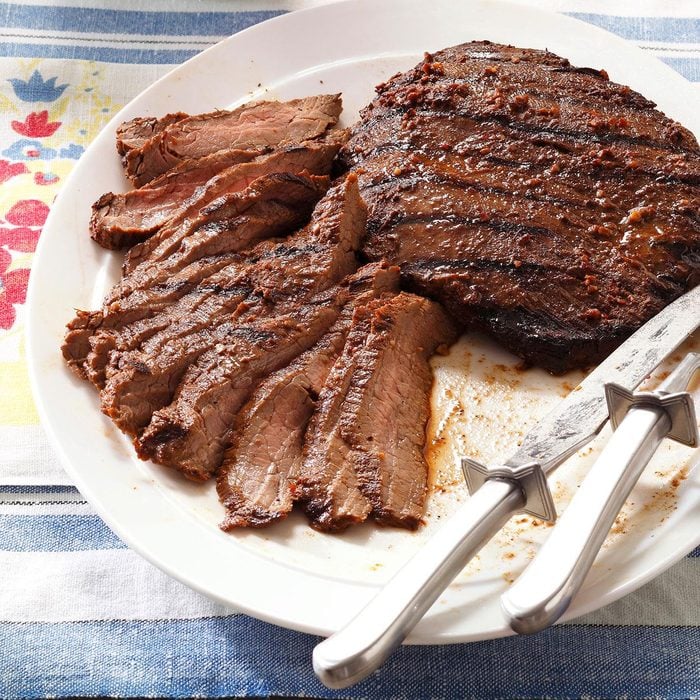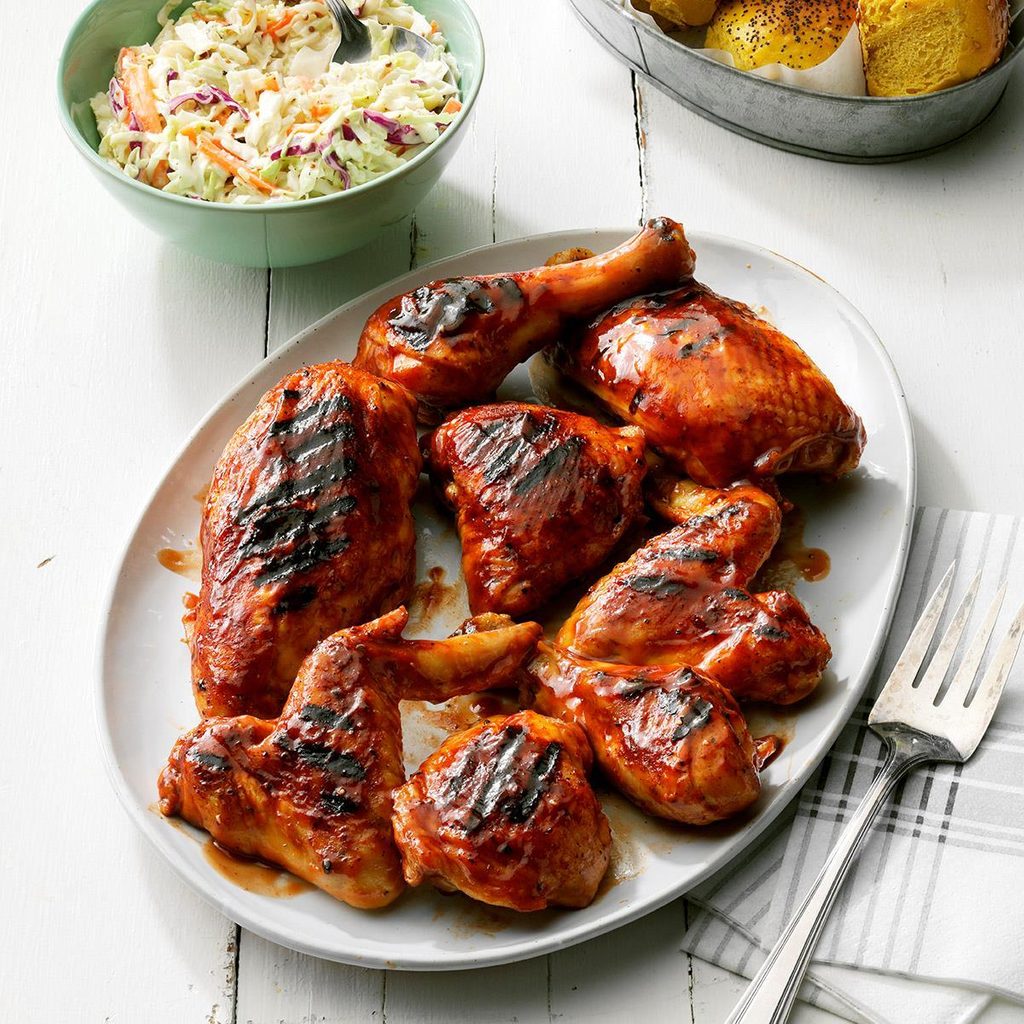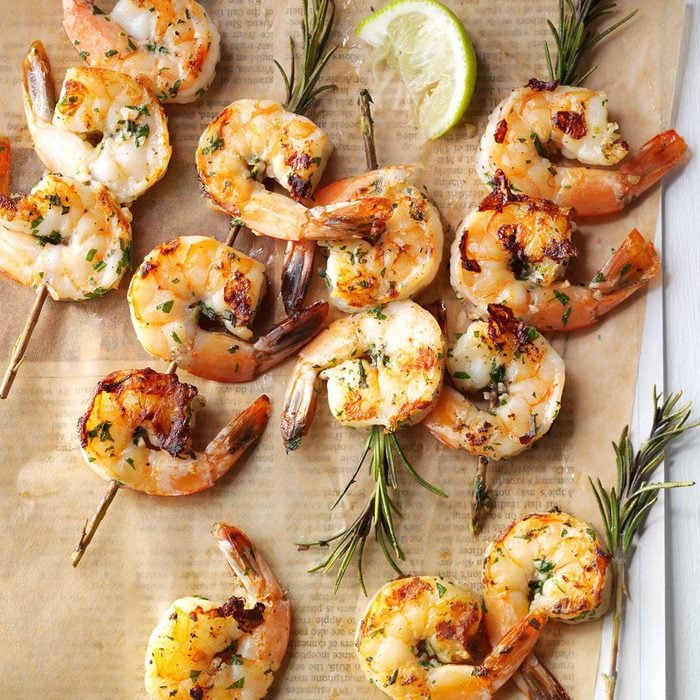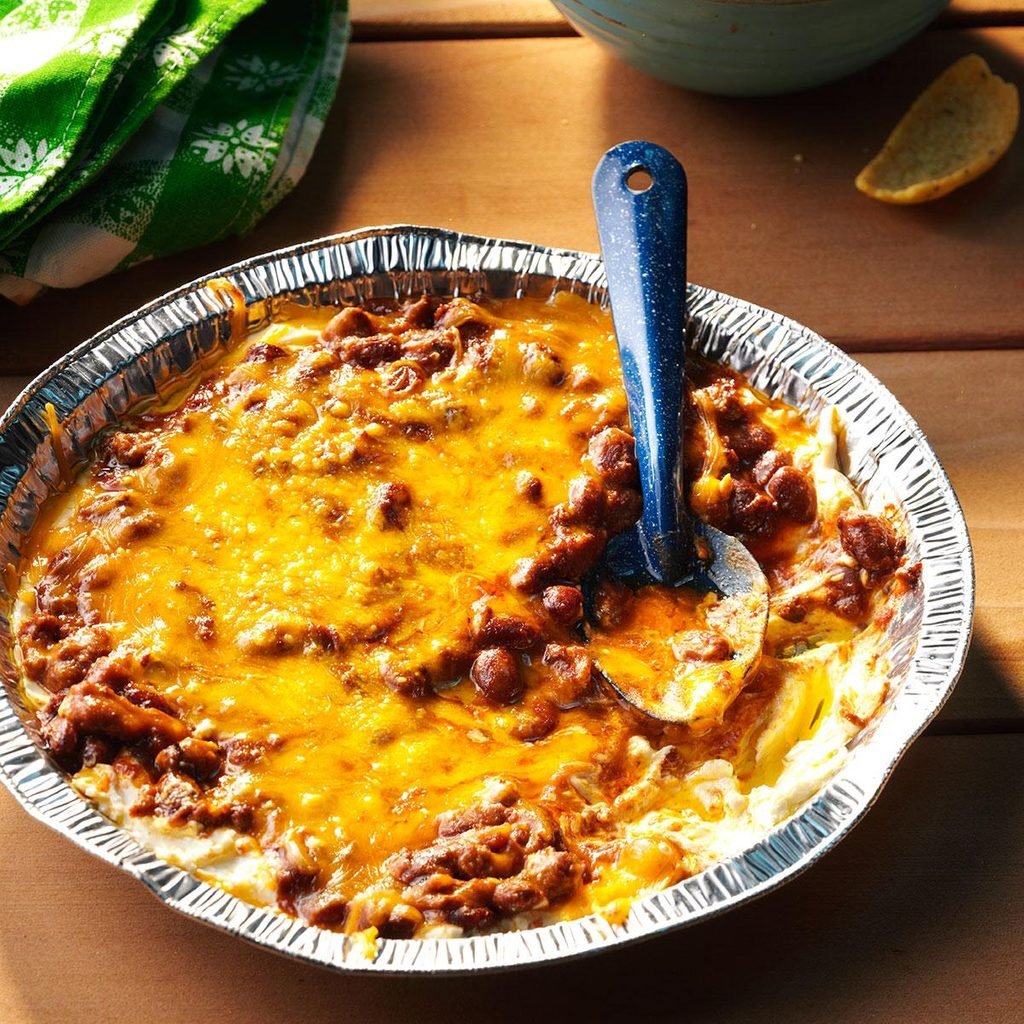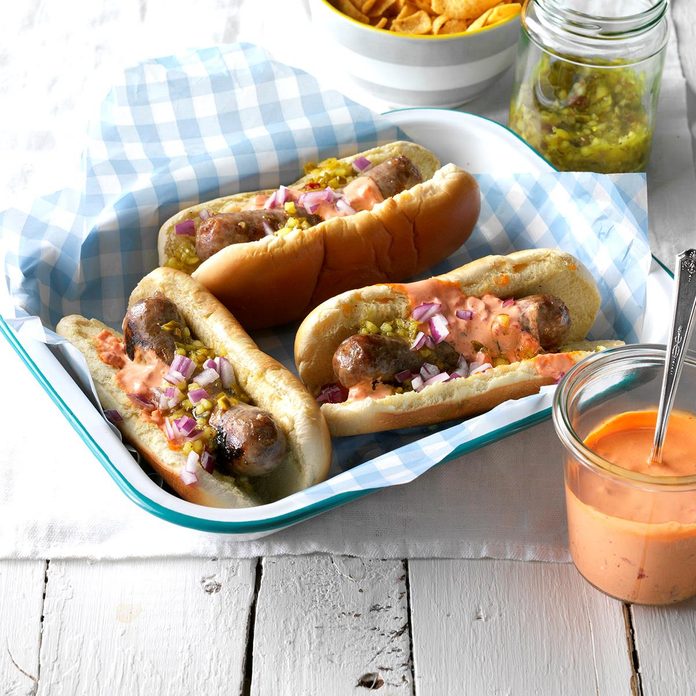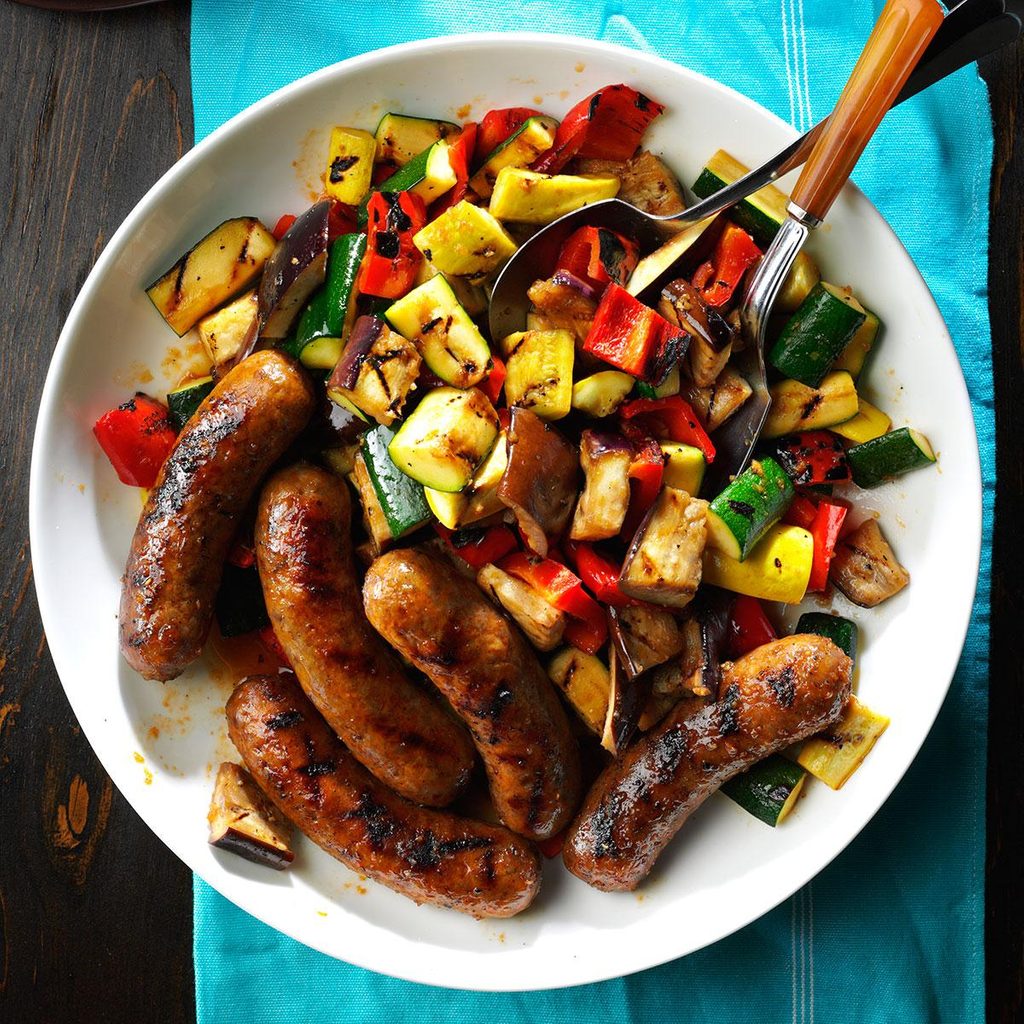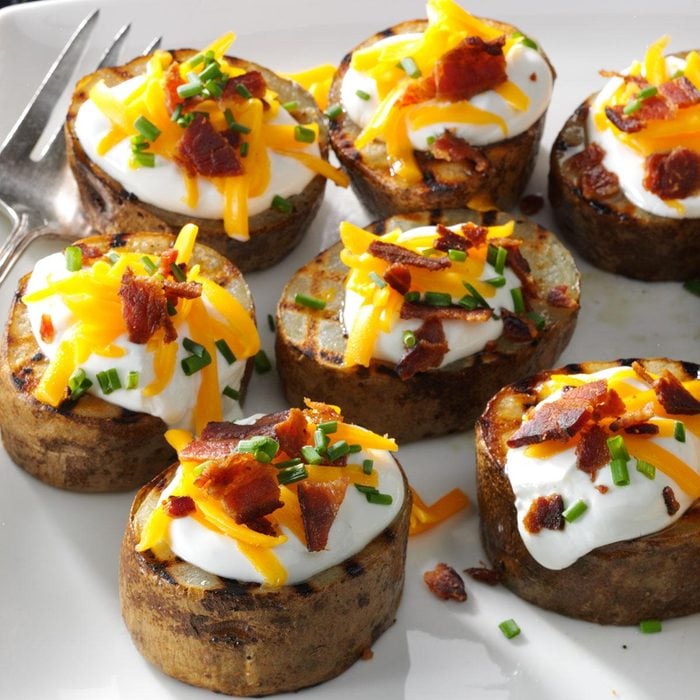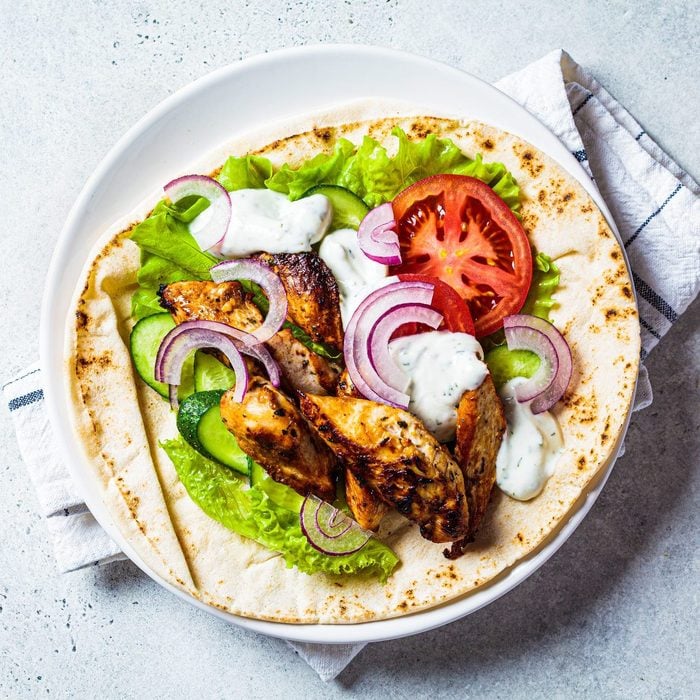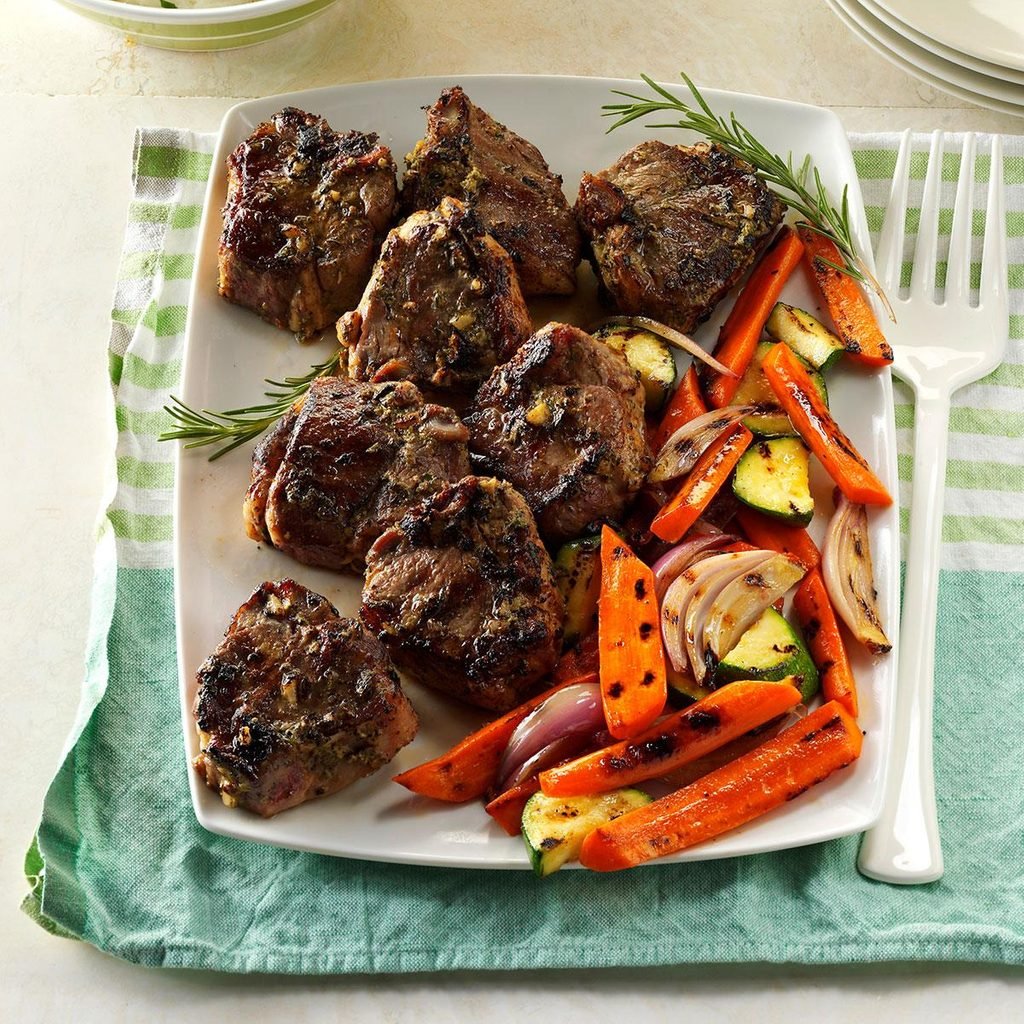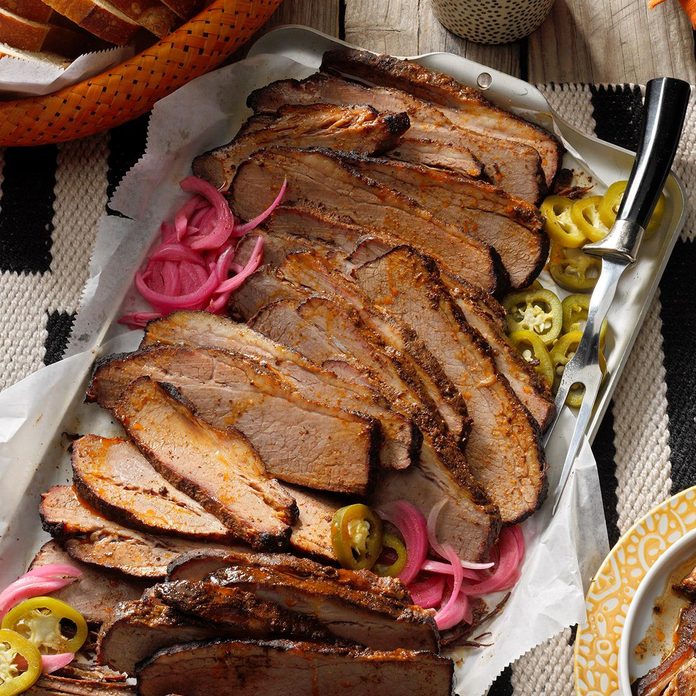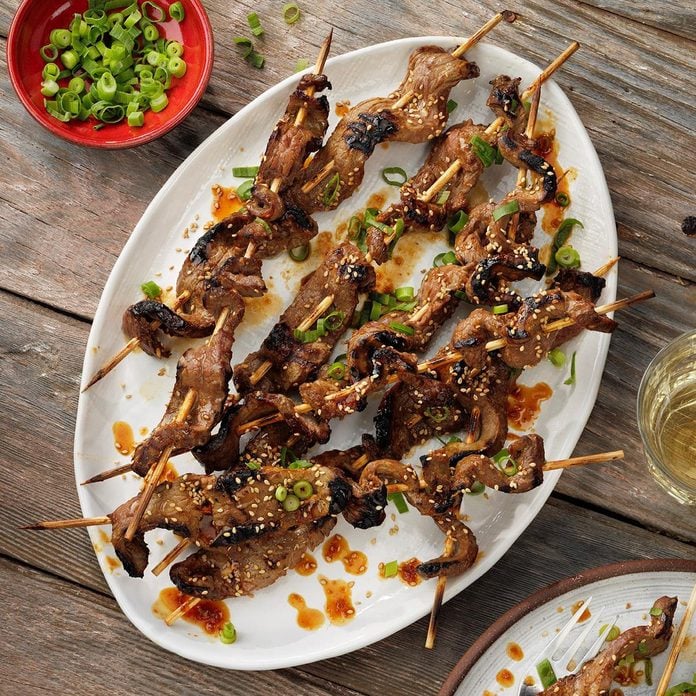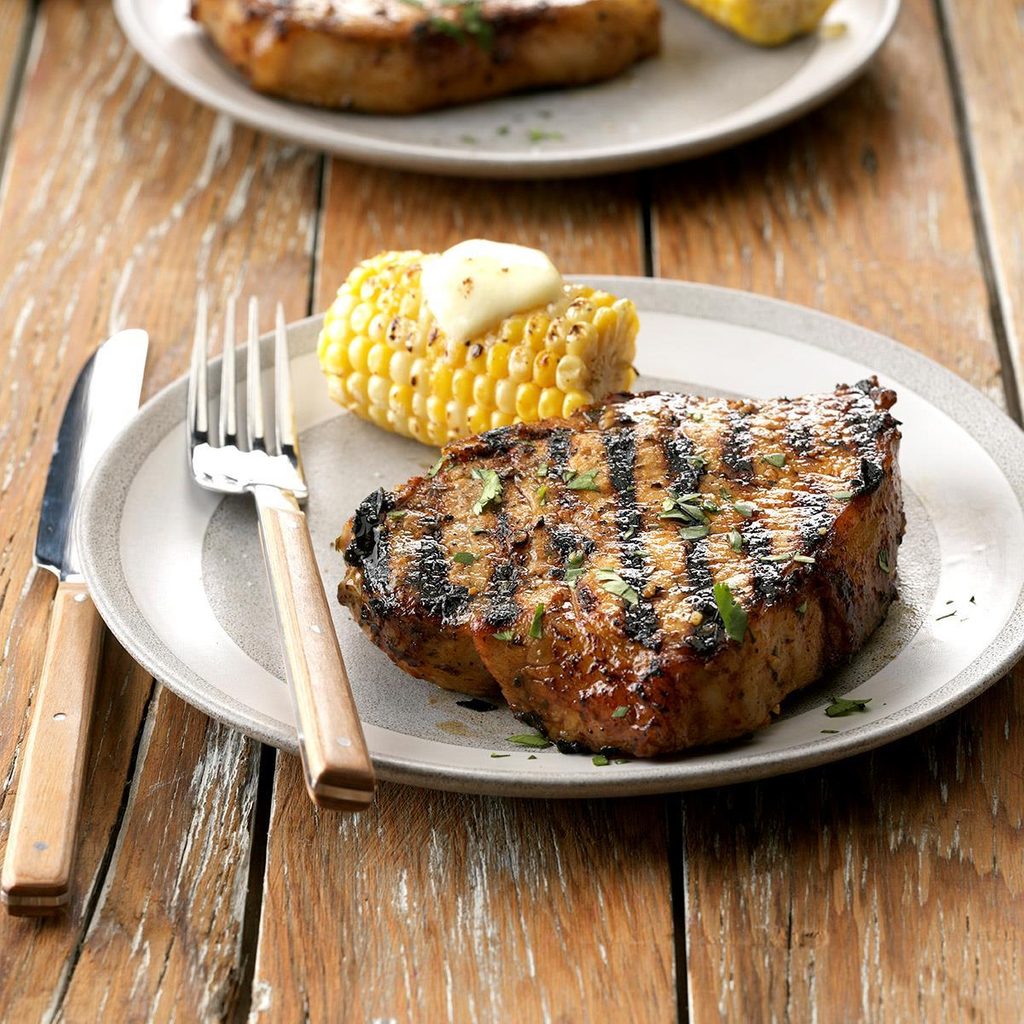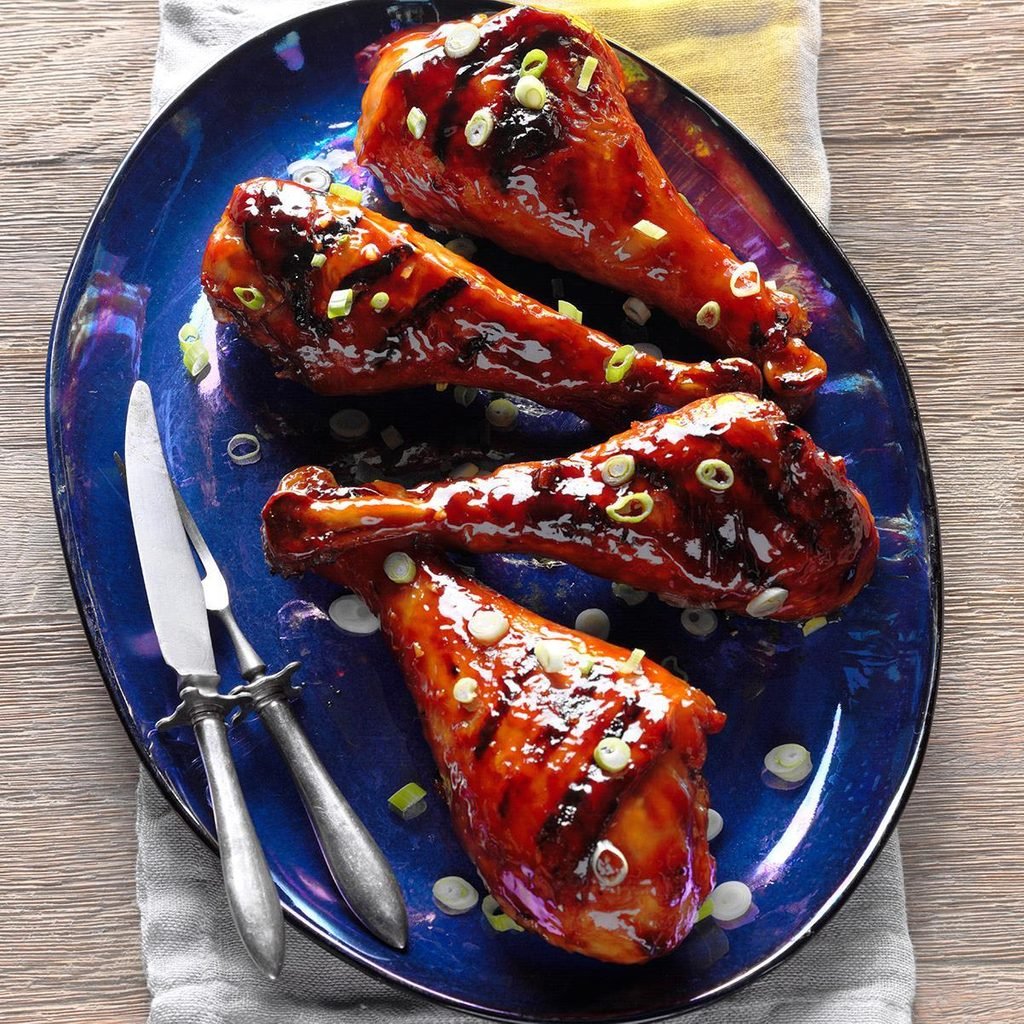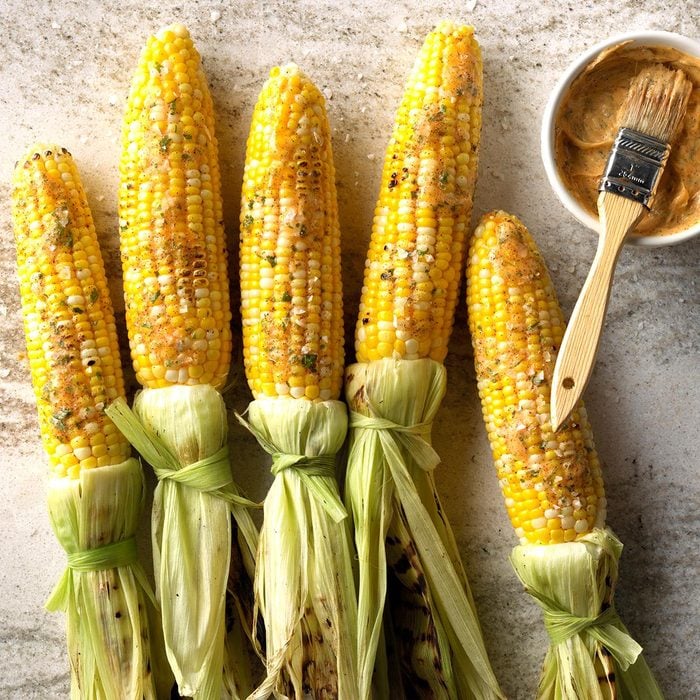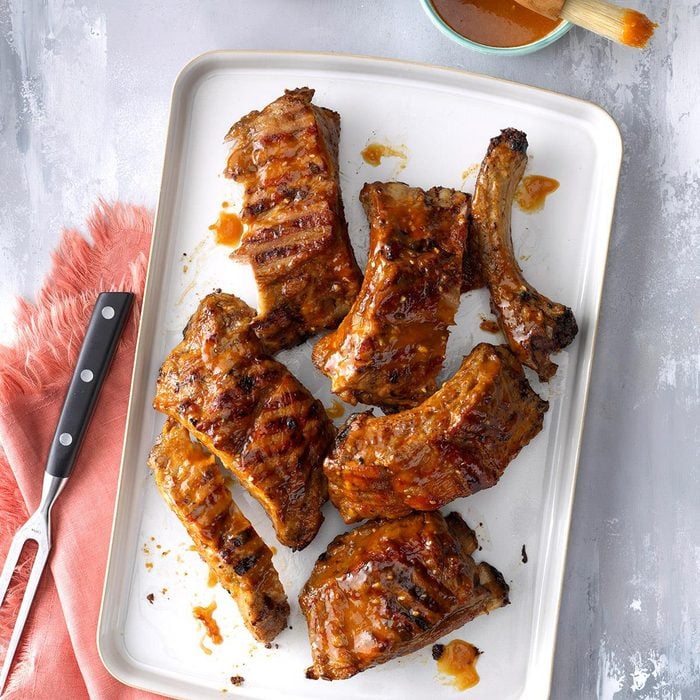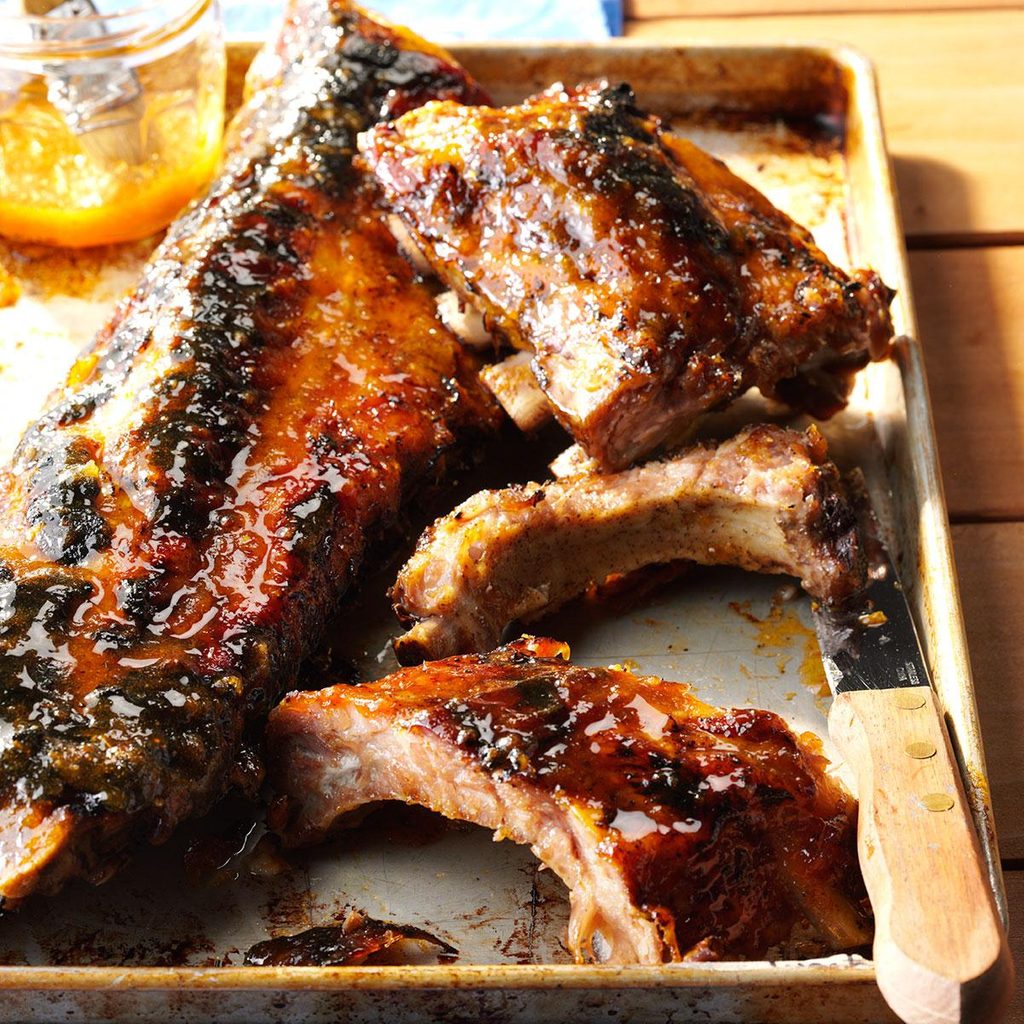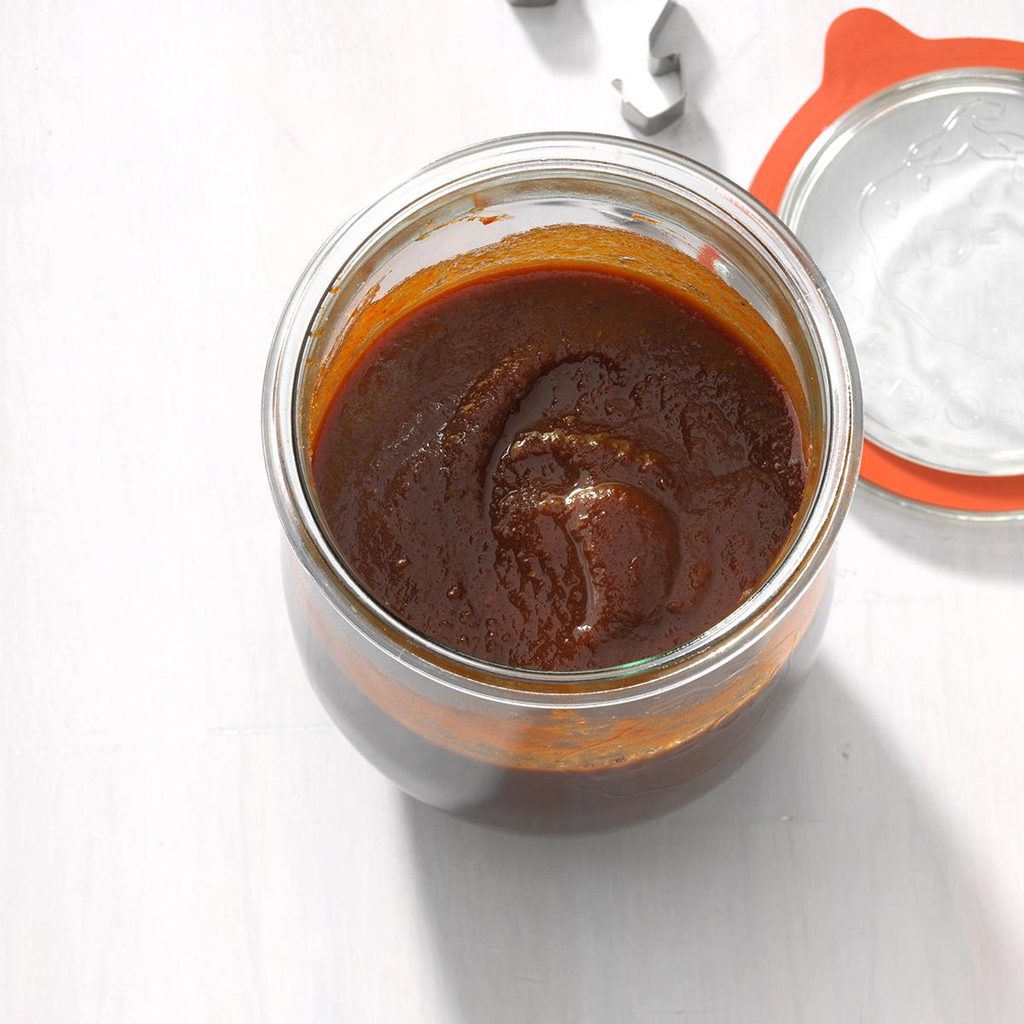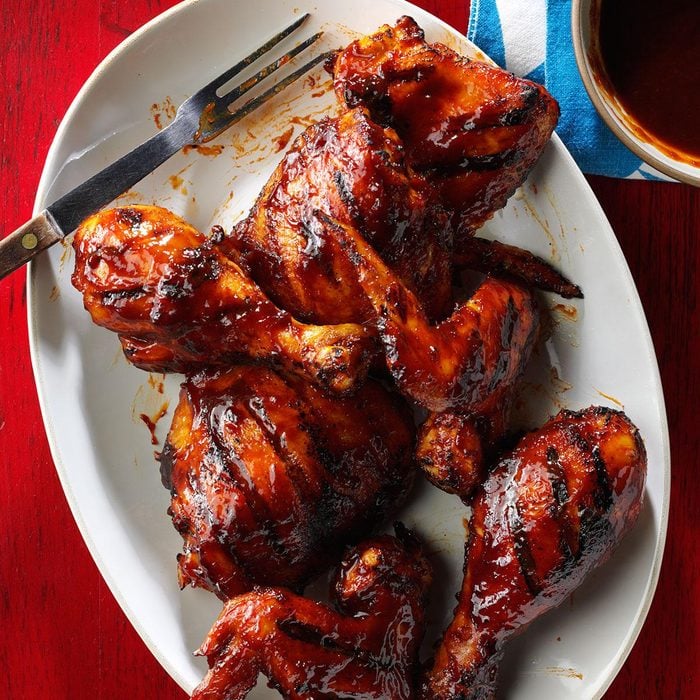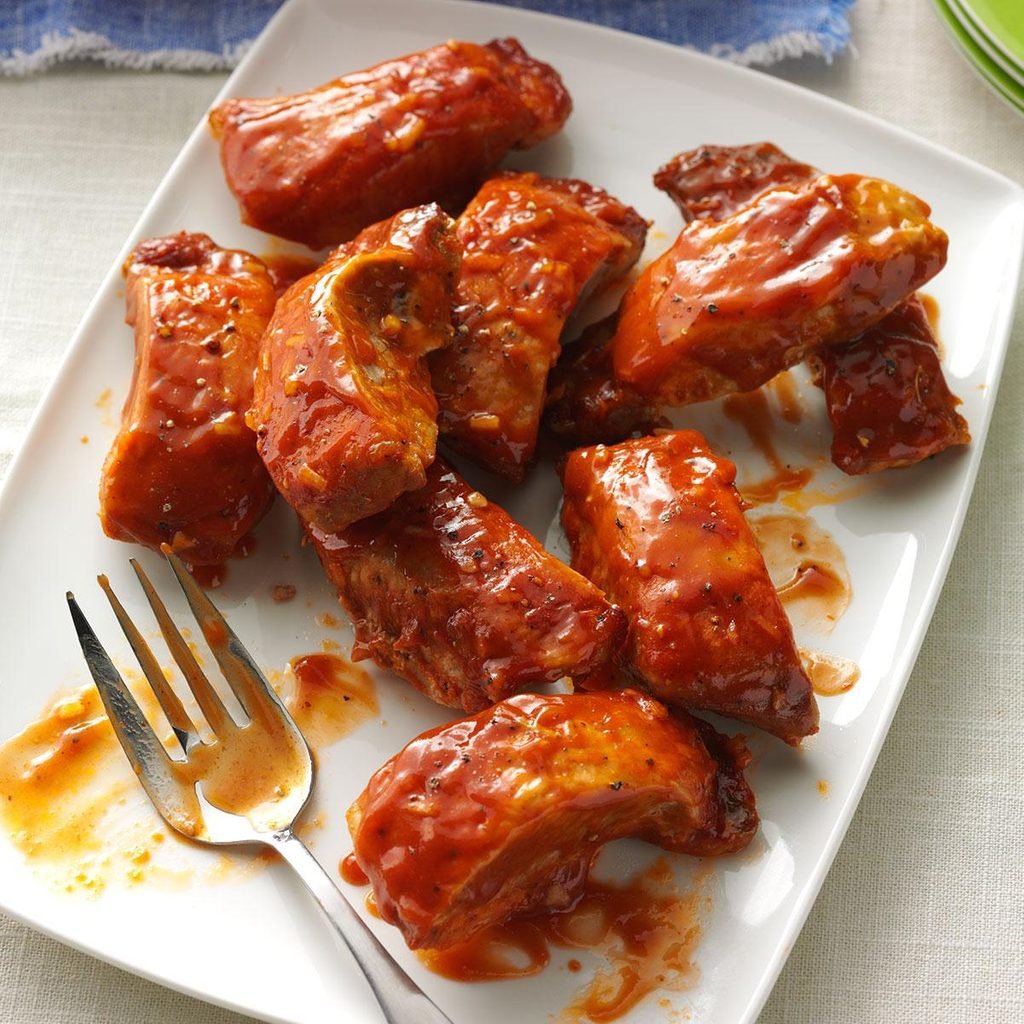The warm weather is finally here and like us, you’re probably ready to get some tasty grilling recipes on the table! But if you’re in the market for a new piece of equipment, it can be hard to know exactly how to choose a grill, because you’ve got way more options than charcoal vs. gas.
Don’t worry—we did all the research so you don’t have to. Whether you’re cooking burgers for two or smoking turkey for the whole fam, we’ve got you covered. Let’s take a look at the top types of grills:
Charcoal Grills
Ideal for: People who don’t want to spend a lot of money on a grill, love the charcoal flavor and are cooking for small groups of people
A true classic! Charcoal grills are portable, easy to use and create a smoky flavor that’s hard to beat. They are slower to heat up than gas or electric grills, but can also get a lot hotter. With no temperature control knobs, grillers will need to arrange the coals to create indirect and direct heat cooking zones.
Using a charcoal grill is messier and more time-consuming than a gas grill (briquettes turns to ash, which needs to be cleaned out after each use), but we’d say the flavor is worth the extra effort. Check out our guide to the different types of charcoal for best-ever results.
We recommend Weber’s Original Kettle Charcoal Grill ($109). Our Prep Kitchen Manager, Catherine Ward, owns four of them for grilling outside all year long. “I have tried less expensive brands over the years,” she says, ” I’ve never had the same quality of heating or longevity that I get from a Weber.” For the best results, also consider these Weber grill accessories.
Charcoal Grill Pros and Cons:
- Pros:
- Amazing smoky flavor
- Easy to use
- Relatively portable
- Cons:
- Less accurate temperature control
- Takes longer to heat
- Harder to clean
Gas Grills
Ideal for: People looking for more space on the grill grates, plus easy-to-use operation
These are your most common backyard grills. Gas grills start fast, heat up quickly, are easy to operate and require much less cleanup than other types of grills. You don’t get the exact same smoky flavor you get from cooking with charcoal, but you can still grill up all kinds of great tasting food, including these tasty grilled side dishes.
ƒGas grills come in a wide variety of sizes. They tend to be the most expensive option, so be prepared to make a longer-term investment. With proper grill maintenance and care, your gas grill will last for years to come. Most gas grills are designed to run on propane, and you will have to refill and replace the tanks as needed.
Senior Food Stylist, Shannon Norris prefers gas grills and recommends the Char-Broil Performance Series 6-Burner Gas Grill. as it’s large enough for entertaining and simple to use. Plus, it has great features like a top rack for keeping food warm and a side table that holds all your favorite grilling accessories. The built-in thermometer is a nice perk, too.
If you’re ready to invest in a top-of-the-line grill that’s built to last, our Test Kitchen recommends the Weber Genesis II E-335 Gas Grill ($950). Recipe Editor Alicia Rooker has had her model for nearly 10 years.
Gas Grill Pros and Cons:
- Pros:
- Simple to use
- Easy to clean
- Heats quickly
- Numerous size options
- Cons:
- Can be more expensive
- Imparts less smoky flavor
- Needs care for a propane tank
Outdoor Electric Grills
Ideal for: Anyone who lives in a condo where gas or charcoal grilling is not allowed, or who doesn’t have a large outdoor space.
If you never want to worry about the hassle of running out of propane or cleaning up an ashy charcoal mess, try an outdoor electric grill. You simply need to plug it into an outlet and get cooking. On average, outdoor electric grills offer the smallest footprint. (They fit perfectly on a balcony!)
Options like Better Chef’s Electric Barbecue Grill ($102) are compact but still can deliver a great tasting meal.
Outdoor Electric Grill Pros and Cons:
- Pros:
- Compact
- Safe for small spaces
- Easy to use and clean
- Cons:
- Can be expensive
- No smoky flavor
Smokers
Ideal for: Barbecue enthusiasts who crave flavor and don’t mind waiting a little longer to enjoy the final product.
Gas and charcoal grills are great for everyday grilling, but nothing delivers rich flavor quite like a smoker. The slow-cooker version of a grill, smokers cook foods at lower temperatures over longer periods of time. Used by some of the best barbecue pros across the county, smokers are now becoming more common for at-home enthusiasts. Because of their size, smokers are also good for grillers looking to cook larger cuts of meat at one time.
The Weber Smokey Mountain Smoker ($329) is a staple piece of equipment at grilling competitions across the country. We love that it has two-tiered cooking grates that allow you to smoke plenty of meat at once. Don’t want to splurge? Here’s how to turn your gas or charcoal grill into a smoker.
Smoker Pros and Cons:
- Pros:
- Deeply smoked flavor
- Large cooking area.
- Cons:
- Long cook times
- Can be expensive
Portable Grills
Ideal for: People who do more grilling on the road than in the backyard.
For anyone who loves to camp or grill on-the-go, portable grills can make cooking easy. These grills are designed to be sturdy and convenient, so you can set up your grill with you when you’re tailgating, camping or on the beach. These easy-to-use grills run on small 16 oz propane tanks that can be stored under the grill lid when in transport.
Senior Food Stylist, Josh Rink recommends the Weber Q 1000 1-Burner Portable Propane Gas Grill ($180). “The grill is the perfect size for cooking for two people and was easy to use.” He explains, “I particularly like that it uses small gas tank canisters—no lugging giant or heavy tanks around!”
Portable Grill Pros and Cons:
- Pros:
- Portable
- Durable
- Simple controls
- Cons:
- Expensive if used infrequently
- Needs a separate propane tank
Indoor Grills
Ideal for: Those without an outdoor space.
Great for apartment or condo owners who don’t have access to a backyard or balcony, indoor grills are smaller counter appliances that won’t fill your kitchen with smoke. There are three main types of indoor grills: a grill pan, an open grill and a griddler (like a panini press). Whichever type you go with, indoor grills are relatively inexpensive.
They’re great for beginners, too. Culinary Assistant, Maggie Knoebel explains, “I do little to no grilling, but I do like my George Forman.” It’s a classic for a reason! Try this family-sized George Foreman Electric Indoor Grill ($55) which has a nifty sloped surface that allows grease to drain into its attached drip tray for easy cleanup.
Indoor Grill Pros and Cons:
- Pros:
- Easy to clean
- Inexpensive
- Can be used indoors
- Cons:
- No grill flavor
- Small cooking area.
Wood Pellet Grills
Ideal for: People who want a hands-off smoker.
Wood pellet grills are one of the easiest ways to add a rich smoky flavor to your foods. Simply set your temperature and cook time and the electric-powered grill automatically adds wood pallets a firepot as need. The specialty pallets come in a range of wood flavors and can be purchased online or at a home improvement store.
The Traeger Ironwood 650 TFB65BLE grill ($1,200) may be a splurge but is totally worth your money. It heats evenly and performs impeccably for hot-and-fast or low-and-slow grilling. What’s more, the grill comes with built-in wifi that allows you to adjust temperatures, add smoke and check in on your meal from an app on your smartphone. You also have the option of pairing it with some amazing Traeger Grill accessories. (Bonus: If you like this, you’ll love their newest addition: the Traeger Ironwood XL.)
Wood Pellet Grill Pros and Cons:
- Pros:
- Set-and-forget controls
- Fast to heat
- Great smoky flavor.
- Cons:
- Expensive
- Requires an electric outlet
Pick the right grill and you’ll be the hero at your next cookout. It sure doesn’t hurt to have perfectly juicy burgers, too!
BBQ Recipes That Put Your Grill to Work
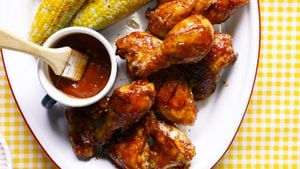 Photo: Taste of Home
Photo: Taste of Home
Big John’s Chili-Rubbed RibsWhen it comes to
barbecue ribs, sometimes the sauce makes all the difference. The glaze for these grilled racks has a bit of Asian influence with soy sauce and fresh ginger.
Pork Chops with GlazeMade with brown sugar, ketchup and rosemary, the glaze is just right for these grilled pork chops. Make sure to let the meat stand for a few minutes after coming off the grill to let the juices redistribute.
Mushroom Bacon BitesWe love barbecue recipes that use the grill for everything from appetizers to salads and desserts. These bacon-wrapped morsels are easy to assemble and will make your party guests go wild for more.
Smoked Pork ButtYou always want to cook a pork butt, also known as pork shoulder, low and slow so the meat has time to become fall-apart tender. While it doesn’t take too much time to prepare the pork, plan on a long cooking time. You won’t regret the results!
Grilled Glazed DrummiesChicken wings are the perfect barbecue recipe for parties and cookouts. Instead of Buffalo-style sauce, try this sweet honey-ginger glaze. Here’s a really good primer on
how to grill chicken wings.
Sweet & Spicy Barbecue SauceThis spicy, deep-brown sauce clings to everything, from chicken legs to pork chops. Make extra and store it for later. Better yet: Give some to friends or as party favors when your guests leave the cookout.
BBQ Chicken SandwichesWhen you don’t have time for a whole grill routine but crave the taste of barbecue, make these easy and quick sandwiches with pre-cooked chicken and a really great homemade sauce. Plus, you can make extra and freeze for another time.
Kansas City-Style RibsLook for well-marbled country-style pork ribs at your grocery store or butcher; they stay beautifully moist during this long cook time. And make a big batch of the dry rub to keep handy for future grilling nights. It’s great on pork, beef and chicken!
Barbecued BurgersBurgers are the quintessential
cookout food, and these will be the hit of any backyard barbecue. The secret: A small amount of quick-cooking oats and an egg will help bulk up and keep those beef patties from crumbling on the grill. Baste them with barbecue sauce to take them to a whole new level.
Cherry Barbecue SauceFresh or frozen cherries add depth, fruitiness and color to barbecue sauce. It’s dynamite on pork ribs, loin or chops, and even chicken.
Grilled Marinated RibeyesMarinate ribeye steaks in this tangy marinade before throwing them on the grill. It’s just as good for leaner steaks like strip, flank or flat-iron, too.
Can-Can ChickenBeer-can chicken is one of the easiest ways to make a juicy and flavorful bird. Use a savory dry rub to add even more flavor.
Flank Steak with Cilantro & Blue Cheese ButterThis is one of those
types of steak that’s sometimes overlooked. It's good for marinating—like with the tangy marinade in this recipe—and grills quickly over high heat. Make sure to slice against the grain!
Grilled Maple Pork ChopsThis simple marinade of maple syrup and balsamic vinegar can turn regular midweek pork chops into something special. Serve with your favorite salad for a fantastic summer meal.
Honey Chipotle RibsThere is nothing beer can’t do: Guinness stout and a few smoky chipotle peppers give this sauce some pop. Grill the ribs over indirect heat and then put them right over the fire for some caramelization.
Apple-Butter Barbecued Roasted ChickenThe secret ingredient here: Apple butter! It works well with jarred barbecue sauce to create a gorgeously grilled bird.
North Carolina-Style BBQ SauceNorth Carolina is known for its vinegar-based barbecue sauce. This recipe uses two different vinegars, and it doesn’t disappoint. Here’s everything you need to know about other
regional barbecue sauces.
Key West Flank SteakThe citrusy marinade adds excellent zinginess to this grilled flank steak. Serve with black rice, beans and plantains for a delicious Key West-inspired meal.
Barbecued Beef BrisketYou need some extra time to grill a brisket, but with this sweet and tangy sauce, it’s worth the effort. Cut the meat against the grain for best results, and serve with extra sauce and soft rolls.
Ultimate Grilled Pork ChopsThe way to a great pork chop: Brine overnight and use a rub. These thick pork chops are juicy, full of flavor and perfect for the summer grilling season.
Rhubarb-Apricot Barbecued ChickenRhubarb, apricot and chipotle peppers give this sauce a spicy-sweet edge. You’ll love it on chicken, but it’s equally as good on pork ribs, pork chops and pork tenderloin.
Quick Barbecued BeansBarbecue recipes aren’t only for meats and other proteins. Throw these simple, classic baked beans on the grill for great smoky flavor.
Dr Pepper BBQ SauceThis is one of those sauces you’ll want to slather on everything, from sliced brisket to ribs. Make ahead of time and store in the fridge to make grilling day a little easier.
Beer-Can ChickenWhile you don’t need a beer-can chicken stand, it does add extra security for keeping that whole chicken upright on the grill. The beer adds flavor and helps keep the chicken tender and juicy.
Teriyaki Shish KabobsYou’ll love how the fresh vegetables and pineapple chars and caramelizes on the grill. While this recipe is for beef, the homemade teriyaki recipe is just as good on pork and chicken.
Southwest SteakThis is a really simple recipe for marinated and grilled flank steak. The lime juice helps tenderize the meat, while chili powder and red pepper flakes add just enough heat.
Grilled Huli Huli ChickenLet boneless chicken thighs soak up a delicious brown sugar, soy sauce and ginger marinade before throwing on the grill. The glaze is great on pork chops, too!
Grilled Vegetable PlatterJust when you thought you could only grill meat and seafood. Gather all the pretty summer vegetables, brush with olive oil or use a marinade, and cook until that natural sweetness comes through.
Sweet Tea Barbecued ChickenYou’ve heard of sauces and marinades that use coffee or espresso, so why not tea?
Apple juice and sweet tea make a delicious sauce for grilled chicken (or any protein).
Lime-Rosemary Shrimp SkewersTurn fresh rosemary sprigs into skewers for this easy grilled shrimp dish. Pair with couscous and a bright salad to complete the meal.
Campers Favorite DipThis dip is the perfect appetizer for cookouts, picnics and camping (even backyard camping). Layer cream cheese, chili and cheese in a disposable aluminum pan and slip on the grill for extra smoky flavor.
Grilled Beef and Blue Cheese TacosTo make these tacos, grill flank, skirt or sirloin steak along with red onions, then toss in a delicious marinade after everything is sliced, and top with blue cheese. Wrap the tortillas in foil and steam on the grill while the steak rests.
Grilled Brats with Sriracha MayoIf you boil fresh brats in beer before the grill, it will reduce the fat a bit. Or just throw them over the fire and keep them juicy. The spicy sauce is great with traditional condiments like relish.
Tuna Teriyaki KabobsWhen making skewers, keep the proteins and vegetables on separate sticks so they can cook more evenly. And reserve some of the light teriyaki marinade for drizzling after everything comes off the grill.
Grilled Sausages with Summer VegetablesEverything for this meal can be made on the grill, making cleanup a breeze. The sausages have a good snap, and the vegetables have just enough char to match their natural sweetness. You can easily increase or decrease the ingredients according to how many people you’re feeding.
Balsamic-Glazed Fig & Pork TenderloinSkewers of pork tenderloin and dried figs with a tangy glaze easily come together. Sprinkle them with blue cheese crumbles and fresh basil for even more flavor.
Grilled Loaded Potato RoundsBecause you’re only grilling potatoes, these are super for outdoor potlucks. Put bowls of toppings near the platter of potatoes on the table, and let your guests build their own creations.
The Best Baby Back RibsDry rub sticks better to marinated ribs, and both add tons of flavor to the meat while it's on the grill. Use both direct and indirect heat for moist and tender ribs.
80 Greek Recipes Everyone Will LoveCan't get enough of your local Greek restaurant? This one's for you! Here are some incredible Greek recipes, as well as Mediterranean-inspired recipes, that are sure to satisfy.
Grilled Corn in HusksThe trick to grilling corn in the husk is soaking it really well before putting it on the grill. When you tear into it, the kernels are soft, a little smoky and super sweet. Use lots of butter after!
Rosemary Lamb ChopsDijon mustard and fresh herbs is a wonderful combination for grilled lamb loin chops. It’s OK to use French-cut lamb rib chops, but adjust the cooking time accordingly.
Firecracker Grilled SalmonSave some of this delicious firecracker marinade for drizzling on the salmon after it comes off the grill. For a party or group, get a full side of salmon for the whole ooh-ahh wow effect.
Smoked BrisketA true smoked brisket takes a few days to prepare and hours smoked over wood to perfect. But it’s always so worth it! The meat gets meltingly tender, just what you want for sandwiches and a side of coleslaw.
Sesame Ginger Beef SkewersMarinate strips of flank steak in a sweet and zippy glaze, then thread on wooden skewers and grill. It’s the perfect barbecue recipe for parties, picnics and summer potlucks.
Lime and Garlic Grilled Pork ChopsUse frozen limeade concentrate as the marinade base for these zingy grilled pork chops. This fresh
pepper mango salsa is the perfect accompaniment.
Grilled Huli Huli Turkey DrumsticksTaking cues from Hawaiian huli huli chicken, these giant turkey legs make a statement! Let the drumsticks sit in the quick and easy marinate overnight for the best flavor.
Easy Grilled Corn with Chipotle-Lime ButterThe chipotle-lime butter is a fantastic addition to grilled corn. Remember to soak the corn, husk and all, before throwing it over the coals.
Texas-Style BBQ SauceMade with pantry staples like ketchup, mustard, Worcestershire sauce and brown sugar, you can have a sweet and spicy Texas-style barbecue sauce in minutes. It’s perfect for all proteins, including beef, pork and chicken.
Peach-Glazed RibsInstead of the usual barbecue sauce, blend peaches, soy sauce, brown sugar and honey for this sweet and spicy glaze. Start basting when the ribs have started caramelizing over the fire, then really add it on right before serving.
Sweet Horseradish Glazed RibsHorseradish adds such a great peppery kick to barbecue sauce, and it’s a surprisingly good pairing with apricot preserves and honey. You can roast them ahead of time and finish on the grill to save time.
Favorite Barbecued ChickenThe trick to this barbecued chicken is grilling the meat skin-side down first, and then adding sauce once you flip it. Then simply baste as it continues cooking for sticky-sweet barbecued chicken.
Red-Eye Barbecue SauceCoffee adds so much depth to this sauce, and harissa and cayenne bring the heat. It’s perfect for steak especially. If you don’t have adobo seasoning on hand, it’s easy to make with spices you have in your cupboard.
Lip-Smackin’ BBQ ChickenMustard, molasses and spices like cumin make this a lip-smackin’ sauce. Make sure to reserve some for the table—everyone will want to slather on more.
BBQ Country RibsWhen your cookout gets rained out, make these saucy oven-baked ribs in a pinch. Serve lots of sides—like potato salad, corn and pickles—for a full spread.
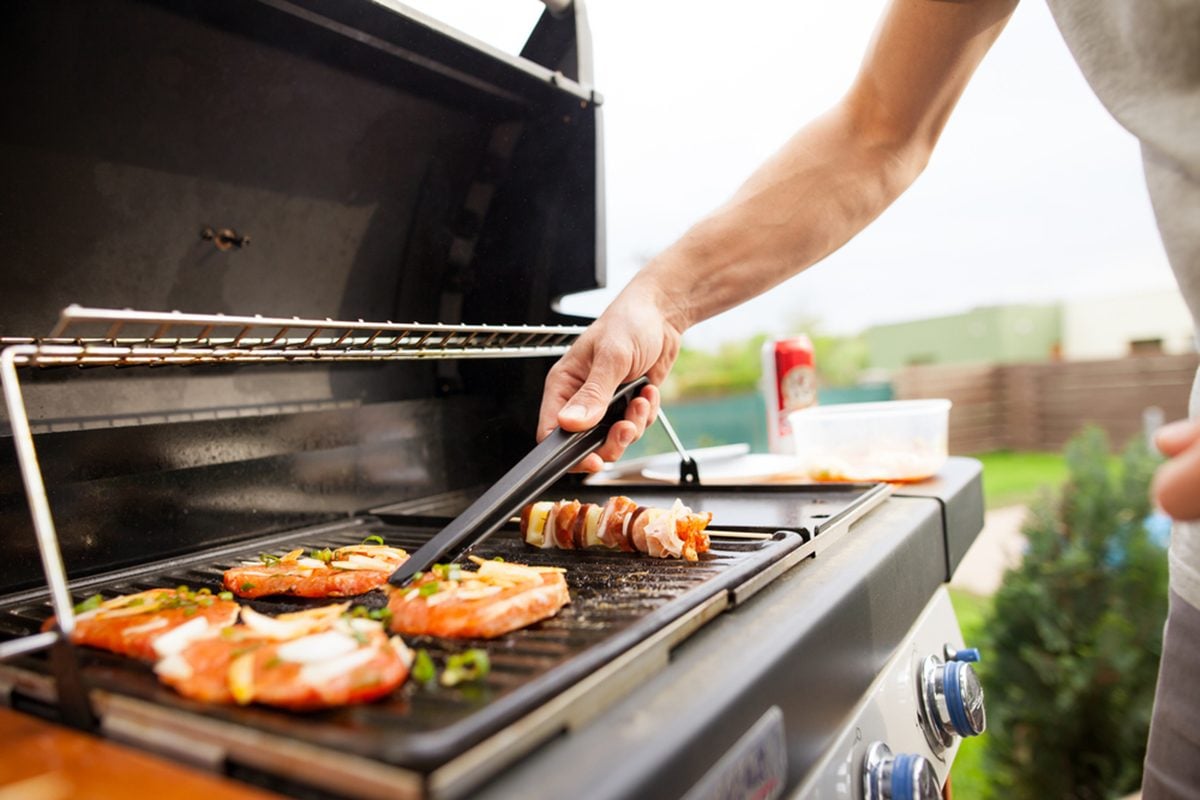

![The Best Weber Grills [Tested and Reviewed]](https://www.tasteofhome.com/wp-content/uploads/2024/05/TOHA24_Webers6-copy_Napoleon-group_Taste-of-Home_01_YVedit_FT_1.jpg?resize=72,72)





















